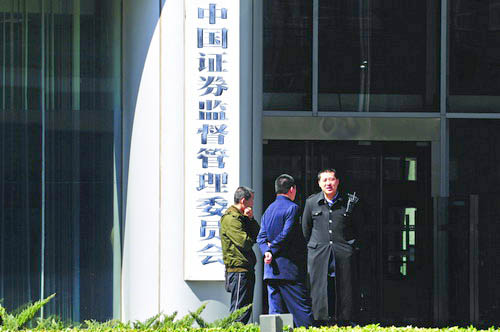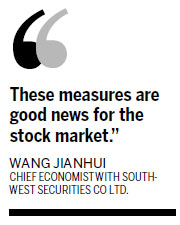Policy changes could lead to return of bull market
Updated: 2012-05-02 10:06
By Gao Changxin in Shanghai (China Daily)
|
||||||||
|
 The China Securities Regulatory Commission announced a series of market-friendly measures during the May Day holiday. [Photo/China Daily] |
Securities regulator lowers trading fees, rolls out detailed delisting rules
A flurry of regulatory changes during the May Day holiday will spur a stagnant equities market and could even spell the onset of another bull market, stock analysts say.
|
 |
The China Securities Regulatory Commission announced a series of market-friendly measures during the three-day holiday ending Tuesday, while trading was suspended. They include lowering trading fees by 25 percent and, rolling out detailed delisting rules, and guidelines on reforming IPO mechanisms.
"These measures are good news for the stock market. We will see a significant rally when trading resumes," said Wang Jianhui, chief economist with Southwest Securities Co Ltd.
The major Shanghai Composite Index has so far climbed 9 percent this year amid speculation that the government will loosen monetary policy to boost the economy.
The market has seen some setbacks recently after many companies reported poor results for the first quarter. The Shanghai index dropped 8.4 points, or 0.4 percent, to 2,396.32 on Friday. It lost 0.4 percent in the past week.
Zhang Qi, an analyst with Haitong Securities Co Ltd, said the regulatory moves target existing structural problems in the stock market, and the policies, if well implemented, will bring the next bull market closer.
"The moves are an important signal that the regulators are committed to fostering the market. It's good news for the market," said Xiang Weida, chief economist with Changjiang Securities Co Ltd.
The mainland's two stock exchanges will lower fees charged for trading yuan-denominated shares by 25 percent with effect from June 1, according to the CSRC. The cut is expected to help traders save around 3 billion yuan ($477 million) annually.
After the cut, the Shanghai and Shenzhen stock exchanges will charge buyers and sellers 0.087 percent of the transaction value. And the Shanghai branch of the China Securities Depository & Clearing Corp will set transfer fees at 0.375 percent of the transaction value.
Wang from Southwest Securities said the cut is aimed at encouraging retail investors to return to the A-share market and push up the trading volume.
The Shanghai and Shenzhen bourses have also drawn up plans to widen the criteria for delisting companies to better protect investors' interests.
Current delisting rules in China fail to get rid of junk stocks as many companies, despite their unprofitability, manage to find ways to meet existing standards to stay public. The move is expected to improve the quality of public companies and reduce risks for investors.
Among the proposed changes, companies with negative net assets will no longer be allowed to remain listed. The bourses may exclude non-recurring items from net income, as some unprofitable companies use government subsidies or other sources to book profits and avoid delisting.
A 2007 accounting rule allows one-time gains to be counted as profit. Annual revenue and trading volume could also be taken into consideration.
Concerning the IPO mechanism, the CSRC published rules asking IPO candidates, among other things, to make additional disclosures once their price-earnings ratio is 25 percent higher than the industry average.
gaochangxin@chinadaily.com.cn

 Relief reaches isolated village
Relief reaches isolated village
 Rainfall poses new threats to quake-hit region
Rainfall poses new threats to quake-hit region
 Funerals begin for Boston bombing victims
Funerals begin for Boston bombing victims
 Quake takeaway from China's Air Force
Quake takeaway from China's Air Force
 Obama celebrates young inventors at science fair
Obama celebrates young inventors at science fair
 Earth Day marked around the world
Earth Day marked around the world
 Volunteer team helping students find sense of normalcy
Volunteer team helping students find sense of normalcy
 Ethnic groups quick to join rescue efforts
Ethnic groups quick to join rescue efforts
Most Viewed
Editor's Picks

|

|

|

|

|

|
Today's Top News
Health new priority for quake zone
Xi meets US top military officer
Japan's boats driven out of Diaoyu
China mulls online shopping legislation
Bird flu death toll rises to 22
Putin appoints new ambassador to China
Japanese ships blocked from Diaoyu Islands
Inspired by Guan, more Chinese pick up golf
US Weekly

|

|






